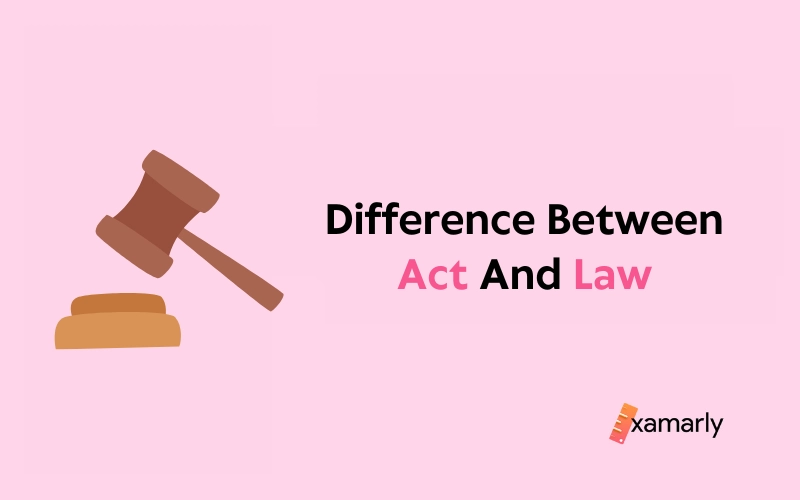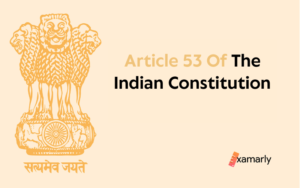An act is a piece of legislation passed by a government body, such as a parliament or congress while a law is a rule or regulation that is enforceable by the government. Both these legal terms are often confused around by common people.
In this article, we’ll dive deep to have a thorough understanding about the legal terminology of an act, a law, and the difference between act and law.
- What Is An Act?
- What Is A Law?
- How Does An Act Turn Into A Law?
- Difference Between Act And Law
- Conclusion
- FAQs On Difference Between Act And Law
- In what ways are laws distinct from acts?
- How is an act different from a law in terms of their enactment process?
- How does the executive branch handle an act versus a law?
- How does the judiciary handle an act versus a law?
- Is an act more specific or more general than a law?
- Can an act be amended or repealed more easily than a law?
- Where does an act come from and where does a law come from?
- In case of conflict which one is applicable, act or law?
What Is An Act?
An act, also known as a bill, is a proposed piece of legislation that is introduced in a government body, such as a parliament or congress. The purpose of an act is to create, amend or repeal a law or set of laws.
An act goes through a regulatory procedure of consideration and debate before it can become a law. The process of passing an act typically begins with the introduction of the bill in a government body like the houses of parliament. The bill is then assigned to a committee for further review and consideration.
During this process, the bill is debated, amended and voted on by the members of the committee. If the bill is approved by the committee, it moves on to the next stage of the legislative process, which may involve further debate, amendments, and voting in the full government body.
After the bill is passed by the government body, it is sent to the head of state or government, who may sign it into law or veto it. If the bill is vetoed, it may be overridden by a two-thirds vote of the government body. Once an act is signed into law, it becomes a law and is enforceable by the government, and any unfair practices against it will be considered an offence.
What Is A Law?
A law is a set of rules or regulations that are created and enforced by a government or other authority aimed at improving the functioning of society and the conduct of people. Laws are designed to govern the behaviour of individuals, organizations and institutions in a society and to provide a framework for maintaining order and protecting the rights of citizens.
An offence is any unfair practice against the types of laws laid down. Laws can cover a wide range of topics, from criminal offenses and punishments to civil rights and economic regulations. They can be created at different levels of government, such as federal, state or local levels regulating any matters of people..
Laws are created through a legislative process, which typically involves the introduction of a bill, or act, in a government body, such as a parliament or congress. The bill is then debated, amended and voted on by the members of the government body. If the bill is approved, it is sent to the head of state or government for final approval and signing into law.
Once a law is in effect, it is enforceable by the government and its agencies, such as the police and courts. Laws are also subject to interpretation by the courts, which help to ensure that the laws are applied consistently and fairly for the benefit of society.
Laws are designed to govern the behavior of individuals, organizations and institutions in a society and to provide a framework for maintaining order and protecting the rights of citizens. They are created through a legislative process and enforced by the government and its agencies, such as the police and courts.
How Does An Act Turn Into A Law?
An act is a proposal for a law, while a law is a set of rules that have been formally adopted and put into effect. Once an act is passed by a government body and signed into law by the head of state or government, it becomes a law.
Following is the process by which an act becomes a law:-
- Proposal: An act is proposed by a member of the legislative branch, such as a member of Parliament or a state legislature.
- Committee Review: The act is then sent to a committee for review and discussion. The committee may make changes to the act before sending it to the full legislative body.
- Debate and Voting: The act is debated by the legislative body and a vote is taken to determine whether to pass the act.
- Assent: If the act is approved by the legislative body, it moves on to the next step of the process.
- Review by the Executive: The act is then sent to the executive branch, which may approve or veto the act.
- Override of Veto: If the executive vetoes the act, the legislative body may vote to override the veto.
- Enactment: If the act is approved by the legislative body and the executive, or if a veto is overridden, the act becomes law.
- Implementation: The executive branch is responsible for enforcing and implementing the law.
- Review by Judiciary: The judiciary may review the law to ensure it is constitutional, and may interpret the law as needed.
- Amendments: Over time, laws may be amended or repealed as needed to reflect changes in society or address new issues.
Difference Between Act And Law
| Feature | Act | Law |
|---|---|---|
| Definition | A bill passed by a legislative body. | A set of rules and regulations. |
| Purpose | To address specific issues or problems. | To govern and regulate society. |
| Enactment Process | Proposed by legislators and assent by vote. | Developed through court decisions and precedents. |
| Role of Executive | Executive branch enforces and implements the Act. | Executive branch enforces and upholds the law. |
| Role of Judiciary | Judiciary interprets and applies the Act. | Judiciary interprets and enforces the law. |
| Specificity | More specific and targeted. | More general and overarching. |
| Flexibility | Can be amended or repealed more easily. | More difficult to change or repeal. |
| Scope | Limited to the issue addressed by the Act. | Can apply to a wide range of issues. |
| Origin | Created by the legislative branch. | Created through judicial decisions and common law. |
| Hierarchy | Acts may be overridden by subsequent laws. | Laws may be overridden by constitutional law. |
Conclusion
In summary, an act is a proposed legislation that goes through a process of consideration and debate before it can become a law, whereas a law is a set of rules or regulations created and enforced by a government or other authority to shape a peaceful society.
Related Articles:
| Aadhaar Act 2016 | Difference Between Socialism And Democracy |
| Difference Between Communism And Democracy | Difference Between Civil Law And Criminal Law |
FAQs On Difference Between Act And Law
In what ways are laws distinct from acts?
An act is a bill passed by a legislative body, typically addressing a specific issue or problem. A law is a set of rules and regulations that govern and regulate society, and can apply to a wide range of issues.
How is an act different from a law in terms of their enactment process?
An act is proposed by legislators and passed by a vote, while laws are developed through court decisions and precedents.
How does the executive branch handle an act versus a law?
The executive branch is responsible for enforcing and implementing an act, while it enforces and upholds a law.
How does the judiciary handle an act versus a law?
The judiciary interprets and applies an act, while it interprets and enforces a law.
Is an act more specific or more general than a law?
An act is more specific and targeted, addressing a specific issue or problem, while a law is more general and overarching, governing and regulating society.
Can an act be amended or repealed more easily than a law?
Yes, an act can be amended or repealed more easily than a law, which is more difficult to change or repeal.
Where does an act come from and where does a law come from?
An act is created by the legislative branch, while a law is created through judicial decisions and common law.
In case of conflict which one is applicable, act or law?
In case of conflict, the law overrides the act, and a constitutional law overrides a regular law.






